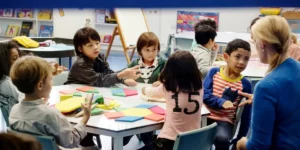Education today transcends academic achievement. It is about equipping students to thrive emotionally, socially, and academically. Social and Emotional Learning (SEL) plays a pivotal role in this transformation. Supported by robust research, SEL is shown to enhance academic performance, improve mental well-being, and promote positive relationships. SEL is not a localized trend but a global movement reshaping education systems worldwide, including India. By embedding SEL into education, schools are nurturing well-rounded individuals ready to face the complexities of modern life.
The Impact of SEL
Research shows that SEL has a significant impact on both students and schools. A meta-analysis of 213 studies, encompassing over 270,000 students, revealed that SEL programs led to an 11-percentile improvement in academic performance. Additionally, SEL has been linked to better social behavior, reduced emotional distress, and increased school engagement.
In the U.S., studies show schools that implement SEL saw reduction in bullying and disciplinary referrals. Furthermore, a survey found that 83% of teachers believe SEL positively impacted student well-being.
SEL Starts Early
Research indicates that SEL can begin as early as infancy. Building social and emotional competence at an early age lays a solid foundation for children’s success. For infants and toddlers, SEL involves forming healthy relationships, responding to caregivers’ cues, expressing emotions, and learning to regulate feelings. These early skills serve as protective factors that help children better cope with adversity, leading to positive outcomes in adulthood.
By the time children reach K-12 schooling, these early SEL competencies enable them to build strong relationships, manage emotions, and develop self-efficacy. In essence, SEL is a continuous process that supports holistic development throughout childhood.
Approaches to Implementing SEL
SEL can be integrated into education through various approaches:
- Integrated SEL: Academic subjects such as mathematics, social studies, or English Language Arts (ELA) incorporate SEL lessons, fostering emotional and social growth alongside academic learning.
- Free-standing SEL lessons: These lessons explicitly focus on teaching students coping mechanisms, emotional regulation, and relationship skills.
- School-wide strategies: Creating a supportive school environment and building positive relationships among students and staff is critical for fostering SEL.
- Teaching practices: SEL-supportive teaching practices include strategies such as reflective questioning, cooperative learning, and project-based activities that help students develop emotional and social competence.
Key SEL Programs
- Better Together Cubed (BT3): The BT3 education initiative offers SEL signature practices designed to enhance the health and well-being of educators, students, and families. Its programs support the emotional climate of classrooms, helping districts and schools create environments conducive to both learning and emotional growth.
- RULER: Developed at Yale University, this program emphasizes emotional intelligence, focusing on Recognizing, Understanding, Labeling, Expressing, and Regulating emotions.
- MindUP: Supported by the Goldie Hawn Foundation, MindUP teaches students mindfulness techniques to improve attention and emotional regulation. Research shows a significant improvement in students’ ability to concentrate and engage in class after participating in MindUP.
- Second Step: A leading program in U.S. schools, Second Step promotes skills such as empathy, conflict resolution, and decision-making.
Global Adoption of SEL
The global education landscape reflects the growing emphasis on SEL. Countries such as Finland and Singapore have successfully incorporated SEL into their national curricula, demonstrating the value of social-emotional competencies. Finland integrates SEL into collaborative learning and emotional well-being initiatives from early childhood. In Singapore, the Character and Citizenship Education (CCE) program prioritizes emotional resilience, which leads to improved academic performance and behavior.
In India, the move toward SEL is still evolving, with progressive schools and state governments leading the way. Prominent schools like The British School Delhi, Dhirubhai Ambani International School, and many other schools have adopted SEL frameworks, aligning with international best practices. Initiatives like the Happiness Curriculum and UDAAN curriculum further reinforce SEL’s relevance, focusing on mindfulness, critical thinking, and emotional regulation. The inclusion of SEL in India’s National Education Policy (NEP) 2020 and formative assessment guidelines by NCERT signals the country’s growing commitment to holistic education.
The future of education in India may soon depend on how well SEL is integrated into national and state curricula.
The Future of SEL in Education
Social and Emotional Learning (SEL) is more than a trend—it is a necessity for shaping future generations. From boosting academic performance to fostering empathy, SEL provides students with the emotional intelligence needed to navigate the complexities of life. As India continues to align its education system with global standards, the role of SEL in schools will be crucial for producing well-rounded, resilient, and compassionate individuals.





